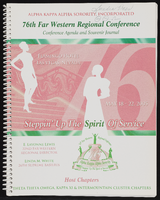Search the Special Collections and Archives Portal
Search Results
Von Tobel Family Papers
Identifier
Abstract
The Von Tobel Family Papers (1905-1997) consist of photographs, correspondence, and financial reports pertaining to the early Las Vegas Von Tobel family and their businesses, which they operated in Las Vegas, Nevada. The collection also contains newspaper clippings covering the life of Edward Von Tobel Sr. and some of the operational business records of the Von Tobel Hardware Store No. 301.
Archival Collection
Eileen Brookman Papers
Identifier
Abstract
The Eileen Brookman Papers date from 1934 to 2002 and document Brookman's personal life and political career. Brookman was active in the Las Vegas Jewish community. Personal papers include programs from B'nai B'rith, scrapbook materials, correspondence, and photographs. The collection includes documentation from the White House Conference on Aging. She served several terms in the Nevada State Assembly from 1967 to 1977 and again from 1987 to 1989. Political materials include legislative information, bumper stickers, election returns, and newspaper clippings.
Archival Collection
Doris Hancock Papers
Identifier
Abstract
The Doris Hancock Papers (1895-1987) consist of school memorabilia, correspondence, sketches, two scrapbooks, and material from her involvement in the Las Vegas Art League. Also included are materials about Southern Nevada and surrounding areas, particularly mining towns, Colorado River, Boulder Dam, Red Rock Canyon, early Las Vegas, and Death Valley.
Archival Collection
Minsky's Burlesque Records
Identifier
Abstract
Minsky's Burlesque Records (1922-1978) contain scripts, publicity, photographs, financial records, payroll records, sheet music, newspaper clippings, contracts, and correspondence. Also included are the personal papers of noted burlesque producer Harold Minsky, who was known for creating the "family burlesque" style of entertainment and for introducing the topless showgirl to Las Vegas, Nevada at the Dunes Hotel in 1957.
Archival Collection
Sherwin "Scoop" Garside Papers
Identifier
Abstract
The Sherwin "Scoop" Garside Papers comprise photographs and documents of Las Vegas Review-Journal writer and photographer Scoop Garside. The collection dates from 1930 to 1983 and includes publicity photos of the Old Spanish Trail, correspondence from the Nevada State Centennial Commission, history of mines (Tonopah, Goldfield, Bullfrog), copies of articles written by Garside, family photos and general photographs of people and places, negatives of Las Vegas, Nevada; Searchlight, Nevada; St. George, Utah; and several unlabeled negatives. The 2017 addition contains newspaper clippings, a scrapbook, Nevada Historical Quarterly, and information on Nevada historic preservation. There is also genealogical information on the Garside family.
Archival Collection
Jeanne Russell Janish Papers
Identifier
Abstract
The Jeanne Russell Janish Papers span the years 1833 through 1994 with an emphasis on 1894 to 1994. The materials of the illustrator and watercolorist include her school records, research papers, diaries, and personal correspondence. There are two original book manuscripts, dried flowers, hand-woven rugs, a variety of art supplies and tools, and approximately 140 watercolor paintings and pencil sketches of various scenes and subjects, created in China, Florida, and the American Southwest.
Archival Collection
Spencer and Georgia Butterfield Papers
Identifier
Abstract
The Spencer and Georgia Butterfield Papers (1890s-1978) consist primarily of photographs and scrapbooks pertaining to Spencer and Georgia Butterfield, a prominent Las Vegas, Nevada couple involved in local business and civic activities. The collection also includes newspaper clippings of their social activities, correspondence, and assorted personal memorabilia.
Archival Collection
Albert S. Henderson Papers
Identifier
Abstract
The Albert S. Henderson Papers (1879-1962), document his career and service as a district judge in Las Vegas, Nevada. Included are correspondence, a personal statement from his election campaign, certificates and proclamations, his memorial book, numerous newspaper clippings, an 1879 edition of Eureka and Its Resources, and various ephemera: union cards, name tags, and election cards.
Archival Collection

Brian Shepherd oral history interview: transcript
Date
Archival Collection
Description
Oral history interview of Brian Shepherd conducted by Claytee D. White on July 13, 2020 for the Boyer Early Las Vegas Oral History Project. Brian Shepherd, Chief of Staff of Service Employees International Union (SEIU) Local 1107, represents health care and public sector employees across the state of Nevada. SEIU advocates for fair wages, quality health care, and the "secret ballot" for all union employees. Shepherd discusses his work with the union, racism, discrimination, inequality, organizing protests, the Black Lives Matter movement, and social justice.
Text

Alpha Kappa Alpha Sorority 76th Far West Regional conference program (MGM Grand Hotel)
Date
Archival Collection
Description
From the Alpha Kappa Alpha Sorority, Incorporated, Theta Theta Omega Chapter Records (MS-01014) -- Ivy Leaf magazines and event souvenir programs file.
Text
